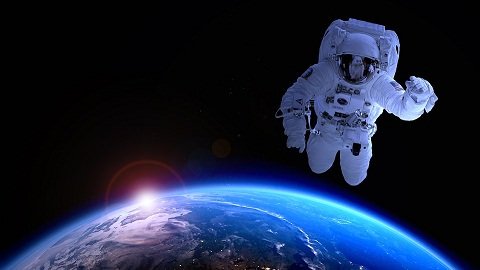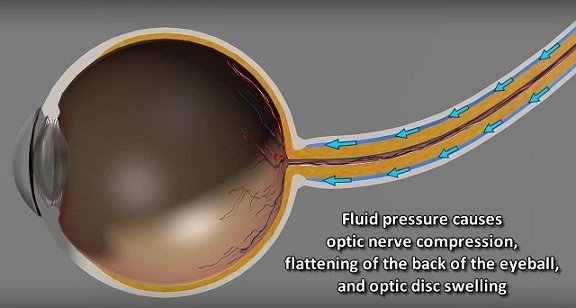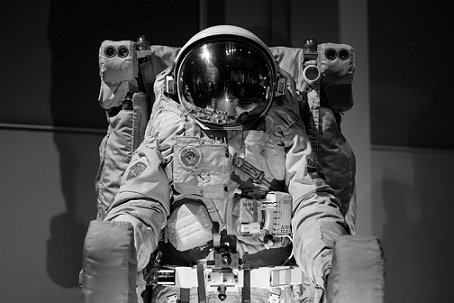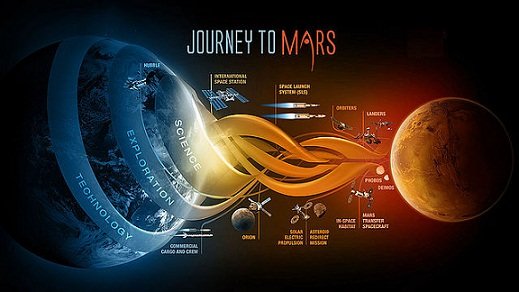Introduction
Space travel has remained one of man's greatest astronomical achievements, which was heralded when Yuri Alekseyevich Gagarin blazed the trail by being the first man to leave the earth's atmosphere [ref]. But one major thing is almost common with astronauts as they return from space travels - they would have a deteriorated eye sight. In this post, we will be looking at the science behind this occurrence. Welcome again to space.

[Image Source: Pixabay. CC0 licensed]
... Here's 1 small step from 1 man, but it is a giant leap for the entire mankind. - Neil Armstrong.
These were the actual words of the man that broke the record for being the first man to touch the ground of moon; which was seen as the height of space travels. And since then, space trips have been seen here and there, just like the Mission-to-Mars that has been long planned, and which is set to happen in few years from now. And just for you to know, a major contender has arisen for the Mission-to-Mars, and she's is Alyson Carson [ref]. But the truth is, some people that have been in space stations for an extended period of time have complained of picking up a very disturbing myopia and other nasty eye defects on their return back home. For example: one of NASA's astronauts; John Philips; who took part in the space travel of 2005 to the ISS (International Space Station), and after spending just 6months there, his vision deteriorated from the normal twenty-twenty to somewhat of twenty-hundred[ref].
Not to talk of the case of another NASA's astronaut; Scot Kelly; who was even selected for the space trip on the basis that he has a very outstanding eyesight, but when he came back (after about 1year), he resorted to using eyeglasses because of his deteriorated vision [ref]. All these; and more; are what piqued the suspicions of people - what da heck happens in space to affect the eyesight of astronauts?
Well, the real question should be: "what happens in you while you're in space?". First of all, we need to understand that the Earth's gravitational pull is different from what is experienced in the space. The space has a microgravity, and this can be remotely queried for this weird deterioration of eye sight. Here in Earth, because of our gravity, our body fluids (which include cerebrospinal fluids) tend to be drawn downwards in our body, but in space, the case is different, and this fluid can be built up in parts of our bodies that they are not required much. Real talk!! The cerebrospinal fluid is actually helpful to us; at least; it works to provide some level of shielding effect to the brain, and even the spinal cord, which also provides nourishing effect to the entire central nervous system, and can also serve as medium of removal of unwanted matter from our brain [ref]. But just like some other things; too much of a thing might not be actually a good thing.
So in space, there is a built-up of this fluid around the region of the brain that hosts the optic nerve (and this nerve is directly responsible for the eye function and relaying of information to/fro the eye). And to compensate for this build-up of fluid within this region, they eyes would normally thin-out a little, and this distortion of the shape of the eye affects how images are formed in the retina.

[Image Source: Screenshot from YouTube Video. Courtesy of NASA. 40seconds from start]
The build-up of this fluid around the eye region has been given a fancy name - "Visual Impairment Intracranial Pressure Syndrome". So from the name, you wouldn’t be wrong to infer that this is as a result of an increased pressure of the cerebrospinal fluid around the eye region, which is caused by the extremely low gravity in space (though it is unclear if neuroplasticity has a part to play in this too). But this is a simple logic: In space, the fluid that should be drawn to the spine and other part of the body; but because there isn't the required force to do so; would find the easiest route - and that's to build up around the option region - myth busted!!, lol. According to one of the lead researchers; Professor Naom Alperin on this same issue:
Cerebrospinal fluid, which normally adjusts to alterations in the pressure of the earth gets disbanded by the microgravity in space, and because of this, it would build up around the eye socket. - Naom A. (department of Biomedical engineering and radiology). Paraphrased by me.
But actually, the scares go just beyond the build-up of these fluids around the eye socket, but according to this research, this can also wrinkle the eyeball, also cause the optic nerve to be inflamed, and can even permanently alter the shape of the retina. Sounds like space travels have opened up the world to another type of health threat.

[Image Source: Pxhere. CC0 Licensed]
Threat to Mission-to-Mars
Like I said before, the world is set to witness a major breakthrough in astro travels with the idea of a Martian trip. But let's look at these little facts about this trip to the red planet. According to this report, the trip is slated for 2033 for obvious reasons; among others; being that the Earth is calculated to be closest to Mars in that years than it has ever been recorded in over 2 millennia. But on the flip side of it, Mars is roughly 54.6million kilometers from the Earth [ref]; which is from the closest point of Mars to the closest point of Earth - the farthest point can be as much as 400million kilometers apart.
Now consider the time it would take to achieve such trip. One of the world's fastest space shuttles is the Juno, which has a top speed of 213,000km/hr; now do the maths - it would take roughly 6-8months of straight journey to get to the red planet. And this journey is not like an Earth journey, but the one that requires movement through regions of varying microgravitational pull. The truth is; are we actually prepared to take such risk? Like the reference I made earlier; Just spending 6months in ISS left John Philips almost blind, but here, we're talking about a journey of over 6months, not to mention the time that would be spent on Mars, and also the time it would take to return back home. I hope the Martian crew would not come back fully blind - but how would they even be able to navigate their way back home if they go blind in Mars? Now that sucks.

[Image Source: Wikimedia Commons. Public Domain Licensed]
Is there a solution?
Currently, the build-up of the intracranial pressure and the cerebrospinal fluid in the optic region is not something that can be stopped by the press of a button. But advances are underway to mimic the Earth's gravitational field (artificial gravity) in space and see if it would work out fine. But what of the space shuttle that would send the astronaut to Mars, any plans for it?
Well, it wouldn't be an easy task to replicate gravity in a space shuttle, but a specialized pressure-inducing suit can be made for the crew that will electronically simulate the effect of gravity on the spinal region, and by that, it would prevent the build-up of the cerebrospinal fluid around the eye socket. But even with this, I still wouldn't take up this kind of journey any time soon till a definitive technology is made to salvage this situation - I can't sacrifice my eye sight for space trips, lol.
Conclusion
"Space trip" has been the fantasy of many people, but the truth some people don't know is; it comes with some obvious threats, and one of them is the partial loss (or complete) loss of vision. Well maybe in the nearest future, we could be able to proffer a more definitive solution to save the eyes of our astronauts while they are enroute to space.
Thanks for reading
References for further reading:
- Going blind in space travel - sciencealert
- Radiological society of North America - Visual Impairment in space
- Ayssa Carson set for Mars
- Effect of space on your body
- Functions of the Cerebrospinal fluid
- Space.com- vision problem


gif by @foundation
Lolzzz. That made me really laugh. This is a fantastic article. Nice work!!!
Downvoting a post can decrease pending rewards and make it less visible. Common reasons:
Submit
Lol.. That's the idea - to make people laugh; while getting educated too :p
Thanks for dropping by buddy
Downvoting a post can decrease pending rewards and make it less visible. Common reasons:
Submit
Possible loss of your eyesight or partake in space exploration....thats a tough choice to make, hopefully there would be an effective solution to it cause we must get to mars
Nice write up
Downvoting a post can decrease pending rewards and make it less visible. Common reasons:
Submit
Sure I hope that too. After all, life is full of choices and risks.. Maybe that's part of their own risk to take :D
Downvoting a post can decrease pending rewards and make it less visible. Common reasons:
Submit
Now you just killed my dream to go to the moon.
Just imagine we with sight issues before and I want to travel to space, I might come back without seeing sef and might probably just leave my glasses there because it would be useless to me well good thing is solution would come up soon
Thanks bruv for sharing
Downvoting a post can decrease pending rewards and make it less visible. Common reasons:
Submit
Lol. Maybe before you're ready for the space trip, a solution must have been found for you :)
Downvoting a post can decrease pending rewards and make it less visible. Common reasons:
Submit
NASA is trying to figure out the alternatives for these major problem facing by the space traveller. Great information provided by you.
And i am also providing a reference for " The Human Body In Space " by NASA HRP(Human Research Program) hope you and your readers will love it.
The Human body in space
Downvoting a post can decrease pending rewards and make it less visible. Common reasons:
Submit
Thanks a lot for the link you provided. It's very appreciated.
Downvoting a post can decrease pending rewards and make it less visible. Common reasons:
Submit
This post has been voted on by the steemstem curation team and voting trail.
There is more to SteemSTEM than just writing posts, check here for some more tips on being a community member. You can also join our discord here to get to know the rest of the community!
Downvoting a post can decrease pending rewards and make it less visible. Common reasons:
Submit